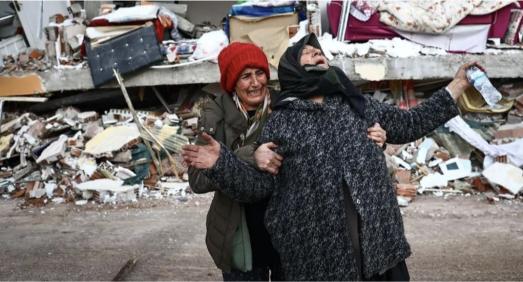Google has acknowledged that its early warning system failed to alert millions of people during the powerful earthquakes that devastated south-east Turkey in 2023, despite being active and capable of issuing life-saving alerts.
The admission comes after new revelations showed that only a tiny fraction of users received the highest-level alert, even though the technology was meant to serve millions near the epicentre.
According to the company, just 469 “Take Action” alerts were sent for the first 7.8 magnitude quake, despite more than 10 million people living within 158 kilometres of the epicentre who could have received the warning.
This type of alert is designed to notify users of serious danger and override a phone’s settings, including Do Not Disturb, with a loud alarm and full-screen message.
Instead, around half a million people were only sent the much milder “Be Aware” notification, which is designed for light shaking and appears quietly on phones.
More than 55,000 people died and over 100,000 were injured when two massive earthquakes struck on 6 February 2023.
Most of the victims were caught off guard in their sleep when buildings collapsed around them.
Android devices, which make up over 70 percent of smartphones in Turkey, were running Google’s system at the time. Yet, due to an underestimation of the earthquake's strength, the system failed to trigger the proper alerts.
“We continue to improve the system based on what we learn in each earthquake,” a Google spokesperson said.
Google had initially told the BBC the system “performed well”, but later admitted it misjudged the intensity of the tremors. Researchers from the company, writing in the Science journal, blamed “limitations to the detection algorithms” that caused the system to estimate the first quake’s strength as between 4.5 and 4.9 on the moment magnitude scale, when it was actually a catastrophic 7.8.
The second major earthquake later that same day also suffered from alerting problems.
Although the system sent “Take Action” alerts to over 8,000 phones and nearly four million “Be Aware” messages, it still fell short of reaching everyone who could have benefited from a stronger alert.
Following the disaster, Google ran a simulation using a revised algorithm and found that, had the changes been in place earlier, the system would have issued 10 million “Take Action” alerts and 67 million “Be Aware” notifications to people living farther from the epicentre.
“Every earthquake early warning system grapples with the same challenge , tuning algorithms for large magnitude events,” the company said.
However, experts say the delay in disclosing these failures is deeply troubling. Elizabeth Reddy, assistant professor at the Colorado School of Mines, criticised the tech giant's slow response.
"I'm really frustrated that it took so long,” she said. “We're not talking about a little event — people died — and we didn't see a performance of this warning in the way we would like.”
The Android Earthquake Alerts (AEA) system works by using motion sensors on millions of phones to detect the shaking caused by earthquakes.
Because tremors travel slower than signals through the internet, users can get a few seconds’ notice before the shaking arrives. But in cases of strong earthquakes, the system must react quickly and accurately to issue the “Take Action” alert that can save lives, especially during night-time events.
The warning was especially vital in Turkey, as the first quake struck at 4:17 am, when most people were asleep. Only the loudest alert would have woken them.
Despite this, the BBC was unable to find a single person across various towns and cities in the earthquake zone who had received the more serious “Take Action” alert before the quake hit. The broadcaster eventually published those findings later that year.
Critics have also raised concerns about countries potentially relying too heavily on Google's system without having fully tested national alternatives.
“Would some places make the calculation that Google's doing it, so we don't have to?” said Harold Tobin, director of the Pacific Northwest Seismic Network. “I think being very transparent about how well it works is absolutely critical.”
Google maintains that its tool is not meant to replace national early warning systems but rather supplement them.
The AEA is currently active in 98 countries. The BBC has reached out to Google to ask how the system performed during the 2025 earthquake in Myanmar but is yet to receive a response.

